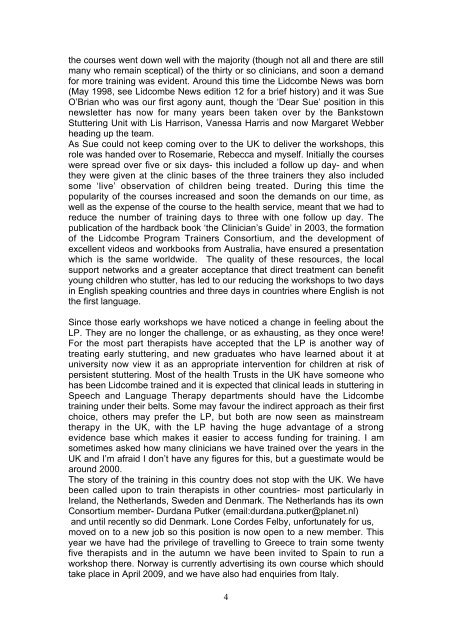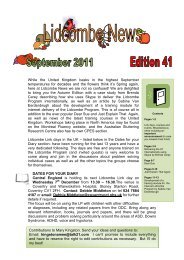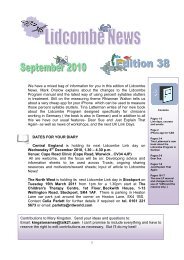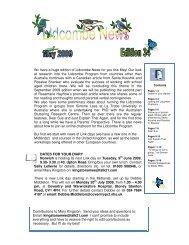Lidcombe News Edition 31st - Montreal Fluency
Lidcombe News Edition 31st - Montreal Fluency
Lidcombe News Edition 31st - Montreal Fluency
Create successful ePaper yourself
Turn your PDF publications into a flip-book with our unique Google optimized e-Paper software.
the courses went down well with the majority (though not all and there are still<br />
many who remain sceptical) of the thirty or so clinicians, and soon a demand<br />
for more training was evident. Around this time the <strong>Lidcombe</strong> <strong>News</strong> was born<br />
(May 1998, see <strong>Lidcombe</strong> <strong>News</strong> edition 12 for a brief history) and it was Sue<br />
O’Brian who was our first agony aunt, though the ‘Dear Sue’ position in this<br />
newsletter has now for many years been taken over by the Bankstown<br />
Stuttering Unit with Lis Harrison, Vanessa Harris and now Margaret Webber<br />
heading up the team.<br />
As Sue could not keep coming over to the UK to deliver the workshops, this<br />
role was handed over to Rosemarie, Rebecca and myself. Initially the courses<br />
were spread over five or six days- this included a follow up day- and when<br />
they were given at the clinic bases of the three trainers they also included<br />
some ‘live’ observation of children being treated. During this time the<br />
popularity of the courses increased and soon the demands on our time, as<br />
well as the expense of the course to the health service, meant that we had to<br />
reduce the number of training days to three with one follow up day. The<br />
publication of the hardback book ‘the Clinician’s Guide’ in 2003, the formation<br />
of the <strong>Lidcombe</strong> Program Trainers Consortium, and the development of<br />
excellent videos and workbooks from Australia, have ensured a presentation<br />
which is the same worldwide. The quality of these resources, the local<br />
support networks and a greater acceptance that direct treatment can benefit<br />
young children who stutter, has led to our reducing the workshops to two days<br />
in English speaking countries and three days in countries where English is not<br />
the first language.<br />
Since those early workshops we have noticed a change in feeling about the<br />
LP. They are no longer the challenge, or as exhausting, as they once were!<br />
For the most part therapists have accepted that the LP is another way of<br />
treating early stuttering, and new graduates who have learned about it at<br />
university now view it as an appropriate intervention for children at risk of<br />
persistent stuttering. Most of the health Trusts in the UK have someone who<br />
has been <strong>Lidcombe</strong> trained and it is expected that clinical leads in stuttering in<br />
Speech and Language Therapy departments should have the <strong>Lidcombe</strong><br />
training under their belts. Some may favour the indirect approach as their first<br />
choice, others may prefer the LP, but both are now seen as mainstream<br />
therapy in the UK, with the LP having the huge advantage of a strong<br />
evidence base which makes it easier to access funding for training. I am<br />
sometimes asked how many clinicians we have trained over the years in the<br />
UK and I’m afraid I don’t have any figures for this, but a guestimate would be<br />
around 2000.<br />
The story of the training in this country does not stop with the UK. We have<br />
been called upon to train therapists in other countries- most particularly in<br />
Ireland, the Netherlands, Sweden and Denmark. The Netherlands has its own<br />
Consortium member- Durdana Putker (email:durdana.putker@planet.nl)<br />
and until recently so did Denmark. Lone Cordes Felby, unfortunately for us,<br />
moved on to a new job so this position is now open to a new member. This<br />
year we have had the privilege of travelling to Greece to train some twenty<br />
five therapists and in the autumn we have been invited to Spain to run a<br />
workshop there. Norway is currently advertising its own course which should<br />
take place in April 2009, and we have also had enquiries from Italy.<br />
4

















